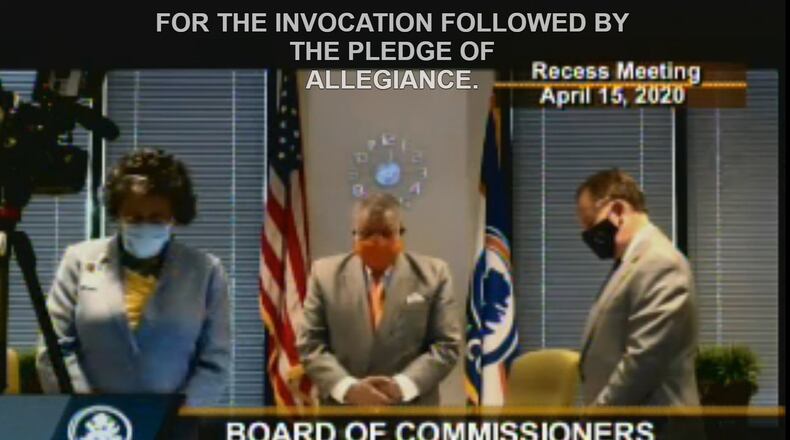There’s a tug-of-war over the $104 million that Fulton County received from the federal government to combat COVID-19.
Six municipalities in southern Fulton wrote to Chairman Robb Pitts asking him to earmark half the money for cities. Pitts wrote back saying he wants to help, but that’s not going to happen.
Fulton met the population requirement for CARES Act dollars, which requires localities have more than 500,000 residents. The only city in Fulton large enough to get its own slice was Atlanta, leaving the other 14 cities in Fulton in a pool with every other Georgia locality asking the state for some of its share.
Pitts said Wednesday at a Board of Commissioners meeting that there are many reasons why the county shouldn’t give cities the money outright: the county could lose tens of millions of commercial tax dollars in the next few years due to economic ripples from the coronavirus crisis;Fulton is responsible for the funds so would have to pay back any misused money; and an allotment might preclude cities from getting money via the state, which has its own allocation. Worse yet, it could lead to “double-dipping,” he said.
The only plan to get cities some of that money came from Commissioners Liz Hausmann and Natalie Hall, who suggested creating a formula to give cities any leftover funds in November as a reimbursement.
“That’s certainly too late,” Union City Mayor Vince Williams told The Atlanta Journal-Constitution on Thursday. “It’s very much appreciated, but we need money now.”
The mayors of East Point, South Fulton, Palmetto, College Park, Hapeville, Chattahoochee Hills, Fairburn and Williams in Union City signed the letter to Pitts. Other than Williams, the mayors were not immediately available for comment Thursday or declined to be interviewed.
“This has been quite unimaginable that local municipalities would be left out. We have been kicked around like last year’s cheap wine,” Williams said.
County emergency staff announced during the Wednesday meeting to spend $3 million on a 30-day supply of personal protective equipment, or PPE, for the cities.
Municipalities are left waiting on money from the state, which does not have to share its subsidy with local governments. Williams said he hasn’t heard anything from the state about if or when the city of roughly 22,000 would get its allocation.
It isn’t just the cities in southern Fulton. Even on the Northside, where median household incomes are higher, Hausmann said she’s hearing from leaders that they’re bracing for unknown hits to their budgets and could use some of the federal dollars.
Georgia State University researchers said weeks ago that the state and local governments could see a $1.27 billion hit from lost sales tax revenue.
“This is not a bailing out of local governments who have done something wrong,” Williams said. “Local governments are the ones that took action first.”
Due to inaction two months ago from the state and federal level, local leaders of all levels were left to make extraordinary decisions about the futures of their communities.
Only now are cities and counties talking about how to slowly re-open facilities. Fulton’s COO Anna Roach told commissioners Wednesday that, if all goes well, the tax assessor’s office could open on May 15 and libraries could have a modified opening on July 1.
“This looks like a new norm for us,” Fulton-Atlanta emergency agency head Matthew Kallmyer said during the meeting. “Until we have a vaccine and we start developing a herd immunity in our community, it will be two years that we’ll be looking like this, maybe even longer.”
About the Author
Keep Reading
The Latest
Featured


